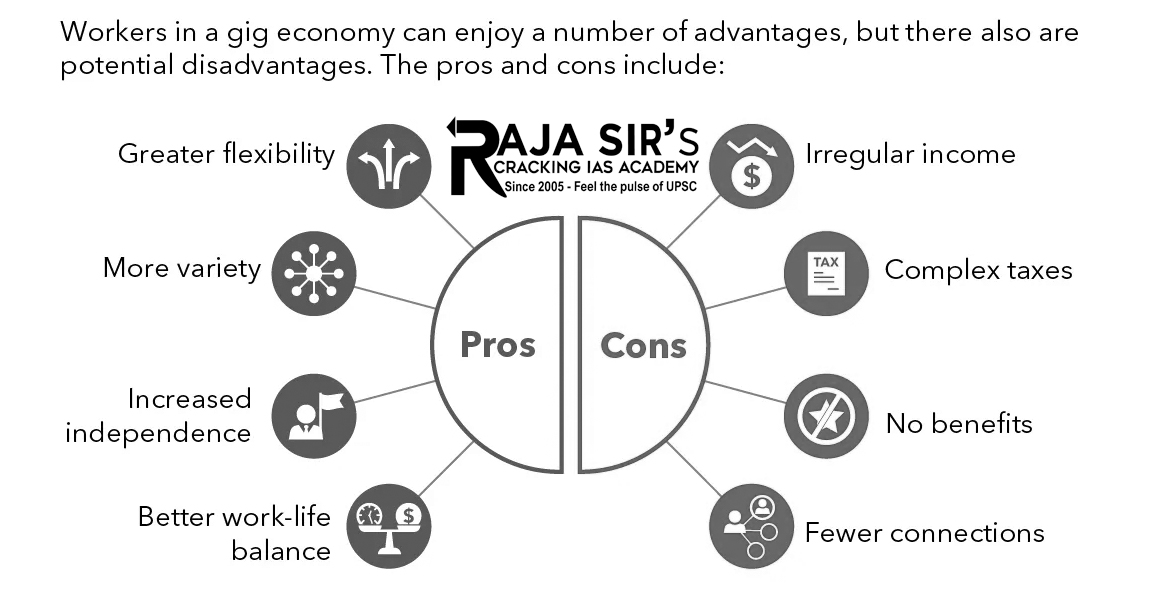- Home
- Prelims
- Mains
- Current Affairs
- Study Materials
- Test Series
 EDITORIALS & ARTICLES
EDITORIALS & ARTICLES
Define the concept of ‘gig’ economy and discuss its impact on labour market and workers’ social security net. 20 Marks (UPSC CSE Mains 2024 - Sociology, Paper 1).
- A Gig Worker means a person who performs work or participates in a work arrangement and earns from such activities outside of traditional employer-employee relationship.
- Broadly classified into 2 categories:
- Platform based: Whose work is based on online software apps or digital platforms. E.g., delivery workers of Zomato.
- Non-platform based: Casual wage workers in conventional sectors, working part-time or full-time. E.g., domestic workers.
- Drivers of Growth: Technological advancements, urbanization, rising middle-class consumption demands, shifts in consumer preferences towards on-demand services, and desire for greater work-life balance among workers.
Challenges for Gig Workers
- Digital Divide: Access to internet services and digital technology can be a restrictive factor for workers.
- Data protection: Opaque decisions made by platform companies on how to collect; store and share personal data of workers impact Right to privacy of workers.
- Lacking ‘employee’ status: Has resulted in several consequences e.g. inability to form unions to represent their interests, exploitative contacts, etc.
- Uncertain Nature of Job: Lack of job security, irregularity of wages, and uncertain employment status for workers.
- Lack of social Protection: workers lack safeguards such as Health Insurance, Employees Provident Fund etc.
- Algorithmic management: Workers face stress due to pressures resulting from algorithmic management practices and performance evaluation on the basis of ratings.

Steps taken for Gig Economy in India
- Code on Social Security, 2020: Provides for extension of social security benefits to gig workers as well.
- Code on Wages, 2019: provides for universal minimum wage and floor wage across organized and unorganized sector which include gig workers.
- e-SHRAM Portal: which is a National Database of Unorganised Workers including gig workers.
- Pradhan Mantri Suraksha Bima Yojana (PMSBY): All eligible registered unorganised workers including gig workers are entitled to get benefit of an accidental insurance cover of Rs. 2.0 Lakh for a year.
- The Centre for Labour Studies, National Law School of India University (NLSUI), Bangalore has been engaged for assistance in framing of a new Scheme for the Gig & Platform workers as well as workers in the unorganized Sector.
- Memorandum of Understanding (MoU) has been signed by Employees Provident Fund Organisation (EPFO) with NLSUI.
Road ahead
- Proper Estimation of Gig Workers: By having separate enumeration exercises.
- Catalyze Platformization: Introducing Platform India initiative (similar to Startup India).
- This platform can help self-employed individuals to sell their produce to wider markets in towns and cities; Ferrying of passengers for hire etc.
- Accelerate Financial Inclusion: Institutional credit to vulnerable section through financial products specifically designed for platform workers by leveraging FinTech industry.
- Enhancing Social Inclusion in Digital Economy: By enabling different sections of workers e.g. women workers and PwDs to take up employment opportunities in platform sector through skill development, access to finance etc.
- Skill Development for Platform Jobs: Pursue outcome-based, platform-led models of skilling and job creation.
- Integrate employment and skill development portals such as E-shram and National Career Services Portals or Udyam portal with ASEEM portal.
- Universal Social Security Coverage: By extending social security measures in partnership mode as envisaged in Code on Social Security 2020.
- Social Security includes paid sick leave, Occupational Disease and work accident Insurance, Retirement/Pension Plans and Other Contingency Benefits etc.
- Tripartite dialogue: Between governments, platform unions and EBMOs on labour issues & worker well-being in platform economy.









 Latest News
Latest News General Studies
General Studies